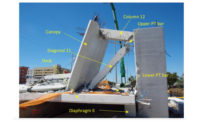Bridges
FIGG Bridge Engineers Sues to Block Federal Debarment

FIGG Bridge Engineers, the Tallahassee, Fla.-based company cited by federal officials for its role in a fatal 2018 pedestrian bridge collapse in Miami, has asked a judge to block the U.S. Dept. of Transportation from suspending the company prior to a proposed 10-year debarment from any transportation projects involving federal funds.
Attorneys for FIGG are seeking a temporary restraining order in federal district court in Washington, D.C.
In its Aug. 11 court filing, the company claims the U.S. DOT's proposed suspensions, issued July 14, "pose a threat of catastrophic and imminent harm" to FIGG "that cannot be reversed if the suspensions are allowed to continue during" the debarment process.
[View 7/31/2020 ENR story on proposed suspensions here.]
The potential harm to FIGG, the company claims, includes losing an unidentified project that currently provides almost half of its revenue.
Although the project isn't named, the Texas Dept. of Transportation announced recently that the joint venture leading the U.S. Route 181/Harbor Bridge in Corpus Christ, had replaced FIGG with a team of Arup and CFC. The switch reflected concerns about the firm’s involvement in the 2018 collapse of a pedestrian bridge at Florida International University.
The collapse killed six people when the concrete truss structure, in the late stages of construction and prior to final connections being made, fell onto a busy road.
DOT's Federal Highway Administration also suspended and proposed to debar W. Denney Pate, FIGG's engineer-in-charge for the Florida bridge project. He is also listed as a plaintiff in the court action.
In an email to ENR last month, an FHWA spokesperson said the agency's actions result from "safety failures" related to the bridge collapse.
The spokesperson added that the suspensions and proposed debarments are "being taken in the interest of protecting public safety."
Asked for comment about the FIGG lawsuit, the FHWA spokesperson said in an Aug. 12 email, "We don't comment on ongoing litigation."
2019 NTSB report
A National Transportation Safety Board investigation report last year blamed several companies for their roles in the tragedy but reserved its harshest criticism for FIGG, the design subcontractor in a design-build contract award. In its report, NTSB stated that several members of the project team failed to exercise their implied authority to stop traffic beneath the incomplete structure as cracks worsened and the project team explored their significance and what to do about them.
FIGG, a 42-year-old company known for its innovative bridge designs, has never conceded any blame in the Florida disaster.
In its motion, FIGG claims—as it did prior to the NTSB's final report on the collapse—that the contractor that retained FIGG, Munilla Construction Management, damaged the partly assembled structure when rolling the bridge sections into final position above the road.
In addition, according to FIGG, MCM failed to properly follow design instructions at a key connection in the unusual concrete truss structure. When the cracks appeared on the structure in the days preceding the collapse, FIGG argues, MCM failed to communicate their dimensions or seriousness to the engineering firm, whose staff was not present at the jobsite.





